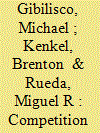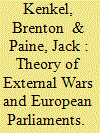| Srl | Item |
| 1 |
ID:
186328


|
|
|
|
|
| Summary/Abstract |
Violence against civilians in civil war is widely thought of as a strategic choice by combatant groups. We argue that a common strategic logic of competition underlies diverse theories of civilian victimization. We develop a theory of strategic complements in victimization, hypothesizing that an armed group’s propensity to victimize civilians will increase with its expectation that its competitors will act likewise. We test this argument by structurally estimating a formal model of strategic interdependence between armed groups using data from the Colombian civil war. Our findings indicate that strategic expectations are responsible for a substantial amount of violence against civilians: the two major combatant groups would have systematically victimized civilians in at least 9% fewer municipalities if they had expected no violence by their rival. Examining causal mechanisms, we also find that victimization in the Colombian case was more likely aimed at controlling civilians than at influencing peace negotiations.
|
|
|
|
|
|
|
|
|
|
|
|
|
|
|
|
| 2 |
ID:
137116


|
|
|
|
|
| Summary/Abstract |
In a recent article in this journal, Chapman presents a formal model of the informational role played by international institutions. Unfortunately, the equilibria given in the article are incorrect. In this article, we identify the errors in the analysis of Chapman and solve for correct equilibria to the model. Our results show little support for the empirical implications derived in the original article. Contrary to these original findings, we find that there may be no relationship between an institution’s policy position and its effect on domestic public opinion or the likelihood that leaders will consult the institution.
|
|
|
|
|
|
|
|
|
|
|
|
|
|
|
|
| 3 |
ID:
191907


|
|
|
|
|
| Summary/Abstract |
The development of parliamentary constraints on the executive was critical in Western European political history. Previous scholarship identifies external wars as a key factor, but with varying effects. Sometimes, willing monarchs granted parliamentary rights in return for revenues to fight wars. Yet at other times, war threats empowered rulers over other elites or caused states to fragment. We analyze a formal model to understand how external wars can either stimulate or undermine prospects for a contractual relationship between a ruler and elite actors. We recover the standard intuition that war threats make the ruler more willing to grant parliamentary rights in return for revenue. Our key insight is that war threats also affect the bargaining position of elites. A previously unrecognized tension yields our new findings: stronger outsider threats increase pressure either on elites to fund the ruler or on the ruler to accept constraints—but not both simultaneously. Elites with immobile wealth depend on the ruler for security. War threats undercut their credibility to refuse funding for an unconstrained ruler. By contrast, war threats make elites with mobile wealth and a viable exit option unwilling to fund a hopeless war effort. Only under circumscribed conditions do war threats align three conditions needed for parliament to arise in equilibrium: ruler willingness, elite credibility, and elite willingness. We apply our theory to posit strategic foundations for waves and reversals of historical European parliaments.
|
|
|
|
|
|
|
|
|
|
|
|
|
|
|
|